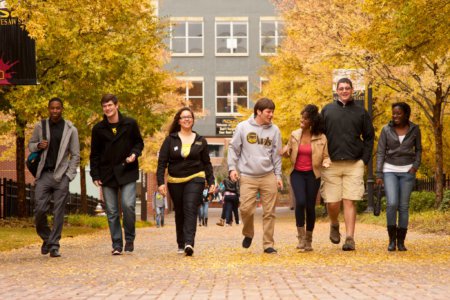
From Mary W. Jackson to Elizabeth Blackwell and Katharine Burr Blodgett — all these women have one thing in common.
They have paved the way for women to pursue an education and a career in a Science, Technology Engineering and Mathematics (STEM) field.
But despite their trailblazing, the number of women in STEM-related fields still remains low as compared to men. In the US, only 28% of women represent the STEM workforce, and they receive lower pay than men.
Recognising the need to increase the number of women in these fields, many universities are taking steps to reduce this gap and to provide women with
If you are looking for an engineering school that prioritises experiential and equal learning for all, here are four universities leading the way to a successful career in STEM:

Michigan Engineering is a top ten engineering school in the US with a strong focus on global equity. Source: Michigan Engineering University of Michigan
Engineering at the University of Michigan
You can’t be what you can’t see. But if you’re at a university that’s in the top 10 for graduating females with engineering degrees – with its number of female graduates rising every year– you’ll have the role models and support systems to realise your STEM aspirations.
That’s what the environment at Michigan Engineering at the University of Michigan has been like for decades. Michigan Engineering is an established leader in transformational change for the representation of women in engineering. Within its top-ranked graduate programmes, more than half of the students enrolled are from outside the US, allowing cohorts to understand problems from multiple perspectives.
Among its faculty, more than half of its leaders are female, ensuring that their views and experiences impact decisions. They are among the experts leading Michigan Engineering’s special brand of practising and teaching with a people-first engineering approach. Beyond offering excellent engineering fundamental and with an interdisciplinary environment, Michigan Engineering sets itself apart by applying equity-centred values and global worldviews — a strategy that elevates all people.
With degrees ranging from Chemical Engineering to Civil Engineering, Computer Science to Climate Science, there are nearly 60 graduate degree programmes offered here. Join one, and see the multitude of opportunities for you to specialise, advance, lead, and make an impact in your chosen field. To shatter glass ceilings and make a positive impact on the world, explore more graduate programmes here.
Virginia Tech College of Engineering
Virginia Tech College of Engineering aims to solve complex global problems through an interdisciplinary and experiential approach. Its curriculum is designed to equip aspiring engineers with the knowledge and skills to solve challenges that plague our world, like Alzheimer’s disease, water contamination, and cybersecurity.
The College of Engineering offers a wide range of programmes, such as aerospace and ocean engineering, biological systems engineering, chemical engineering, electrical and computer engineering, mechanical engineering and many more.
In creating the next generation of global leaders, Virginia Tech recognises the importance of promoting and supporting the number of women in STEM. As such, it established the Society of Women Engineers (SWE), which works towards encouraging women in these fields to pursue their interests and reach their full potential. Professional and social events are held to help women interact with others and build their network in the industry.
An example of how their efforts have helped female students achieve a successful career in the industry is alumna Rosa Avalos-Warren. Avalos-Warren is now a network director at the NASA Goddard Space Flight Centre. As someone always interested in space exploration, Virginia Tech allowed her to explore her interests and kickstart her career through their aerospace engineering programme.
Her degree gave her the knowledge and skills that prepared her for her career. She was able to understand how to apply theory to real-life situations. After graduating, she secured a job at NASA, where she had multiple engineering and management roles, leading more than 25 missions for flights to the International Space Station and the Commercial Crew Programme and also working as the human spaceflight mission manager for the Artemis programme.
None of this would have been possible without the support and guidance she received. “With a lot of support from my parents, brothers, Virginia Tech’s professors, and my mentors, I was able to fulfil my dream of becoming an aerospace engineer,” Avalos-Warren said.

NYU Tandon School of Engineering is the second oldest private engineering and technology school in the US. Source: NYU Tandon School of Engineering
NYU Tandon School of Engineering
Aiming for the day that the number of women in STEM is equal to that of men, NYU Tandon School of Engineering is tirelessly working towards supporting and promoting women in these fields.
To do so, they have established a supportive environment that aims to increase women’s representation, retention and success through a wide range of programmes, services and activities. These include K-12 Outreach, Urban Assembly Institute, Black Girls CODE, Girls Talk Tech, Women in Engineering Explorations Community, WoMentorship Programme and many more.
Jelena Kovačević, the first female dean in NYU Tandon history, aims to boost the number of women students and faculty members. This is in addition to investing in societally important research areas like cybersecurity, health, and sustainability.
The School of Engineering established the Experiential Learning Centre (ELC) to allow students the opportunity to explore immersive and multidisciplinary learning, collaboration, and career prospects. All the programmes are designed to develop 21st-century skills in their students to prepare them with the knowledge and hands-on experiences to solve real-world problems in the working world.
Research is at the university’s centre as they believe that a better world is formed through this. As such, its students and faculty members participate in academic research to discover practical solutions to the most pressing challenges facing society and to address tomorrow’s problems today.

Northeastern University College of Engineering is an R1 research and experiential university in Boston. Source: Northeastern University College of Engineering
Northeastern University College of Engineering
Northeastern University College of Engineering is a top-ranked, R1 top-tier research university in Boston, Massachusetts, with a global network of campuses, is a leader in civil and environmental engineering education, research, and experiential learning.
The Department of Civil and Environmental Engineering offers a Master of Science in Civil Engineering, and students can delve into their area of interest by selecting from six concentrations. A Master of Science in Environmental Engineering is also offered as is a Doctor of Philosophy degree in Civil and Environmental Engineering and in Interdisciplinary Engineering. Specialized interdisciplinary master’s degrees include the MS in Sustainable Building Systems and the MS in Engineering and Public Policy.
With a constant eye on the emerging needs of industry, Northeastern recently added a concentration in Data and Systems to its civil and environmental engineering portfolio. Artificial intelligence and machine learning open exciting new opportunities for researchers to learn from and leverage data, while the increasing availability of affordable sensors is changing the way cities and the environment are measured and monitored. Buildings, transportation networks, energy utilities, and water resource infrastructure are designed with increasingly complicated smart technology. The curriculum is designed to give the engineers of tomorrow the interdisciplinary knowledge, and technical and analytical skills to build, maintain, and learn from AI and smart systems and the large quantities of data they produce.
“Our students develop as innovators and leaders through Northeastern’s distinctive model of experiential learning, anchored by our world-leading cooperative education programme and augmented by novel initiatives in innovation, entrepreneurship, business/management, international opportunities, and a multitude of award-winning student clubs,” says Gregory D. Abowd, Dean of the College of Engineering.
“The combination of challenging classroom study in a wide variety of academic programs with opportunities for professional practice, innovative projects and research ensures that we are preparing the next generation of engineers to keep pace with today’s fast-changing technological advances and global demands.”
*Some of the institutions featured in this article are commercial partners of Study International









